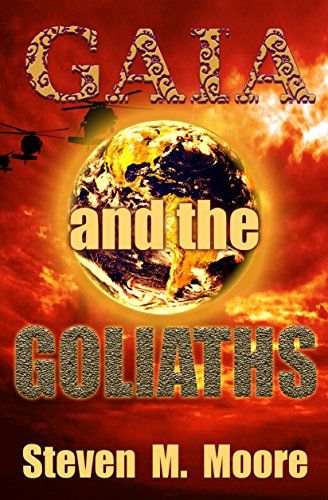
Mystery, Suspense, Thriller
Date Published: February 5, 2017
Publisher: Carrick Publishing
An environmental activist is murdered on a street in Manhattan after a protest. NYPD homicide Detectives Chen and Castilblanco get the case. While pursuing the clues to find those responsible, they discover the activist’s boyfriend is in danger because he has key information that will expose an international conspiracy involving Europe, Russia, and the U.S. As the tangled web unravels, an old nemesis of the detectives makes his appearance.
Other Books in the Detectives Chen & Castilblanco Mystery Series
NYPD detectives Chen and Castilblanco continue their adventures in this sixth novel in the series. Castilblanco’s relative Teresa and Nasir are an item, but Nasir kills Teresa’s taunting and jealous ex-boyfriend in a fight. When they look to Nasir’s friends for help, those friends kidnap the two fugitives who become involved in a terrorist plot.
While the two detectives try to find Teresa and prove her innocence, a case in a different precinct involving a different Castilblanco relative surfaces. The cop’s uncle, other detectives, and the Coast Guard help sort things out, including the connection to an old mafia family.
Published: 2010
The murders of a Wall Street broker and a Navy SEAL in Manhattan only miles and minutes apart seem unrelated, but two homicide detectives discover a connection. As the strange cases merge and they chase down the killers, even with federal stonewalling, they uncover a terrorist plan to destroy two American icons and generate a financial crisis bigger than the Wall Street implosion of 2008. Hiding in the background are webs of international intrigue taken from today’s post-9/11 world.
Published: March 2012
Steve Moore gives a new meaning to “narco-terrorism” in this new thriller that has your favorite NYPD homicide detectives Rolando Castilblanco and Dao-Ming Chen thwarting another terrorist plot, as they did in The Midas Bomb. Castilblanco uses his old Navy SEAL skills to good effect and Chen takes on a new sexy and independent role against the combined forces of al Qaeda, a Mexican cartel, and neo-Nazi militia members.
Published: May 2013
With Teeter-Totter between Lust and Murder, Steve Moore continues the “Detectives Chen and Castilblanco Series.” The sleuths of The Midas Bomb and Angels Need Not Apply will embroil you in action and suspense yet again.
As a mystery novel, it is a dark probing into the nexus the crime underworld sometimes enjoys with the rich and powerful. Chen is arrested for the murder of a senator in circumstances that seem to leave no doubt of her guilt, but Castilblanco helps prove her innocence.
With this new crime novel, Steve continues the saga of your two favorite detectives as they and their companions fight the corrupting influence of the illegal weapons trade.
Published: March 2014
Aristocrats and Assassins continues the “Detectives Chen and Castilblanco Series.”
NYPD detectives Chen and Castilblanco leave their comfort zones once again. Chen goes to China where she helps the DEA track down a money laundering scheme. Castilblanco is in Europe on vacation with his wife. They meet up to thwart a terrorist who’s kidnapping members of the European royal family. What relation does he have to the money laundering scheme? Why does he have a vendetta for Castilblanco? What’s his real agenda? Join Chen and Castilblanco on a tour of Europe you won’t find in Frommer’s.
Published: November 2014
Chen and Castilblanco are back in the Big Apple. They begin to investigate the murder of a SOHO art dealer, delve into the shadowy world of art thieves, and discover that stolen artworks can be used as collateral to finance some dark entrepreneurship. The Collector is book five in the Detectives Chen and Castilblanco series.
Excerpt
Excerpt from Steven M. Moore’s Gaia and the Goliaths, #7 in the “Detectives Chen and Castilblanco Series”, Carrick Publishing, 2017:
Chapter One
Dr. Guillermo Sanchez ran with EMTs as they guided the gurney through the halls on the way to one of Bellevue’s ORs. His job was to stabilize the shooting victim for the surgeon, but stabilize wasn’t the right word in this case. The young woman flat-lined twice before the surgeon arrived.
“Wash up, Guillermo,” said Dr. Wilson. “I’m going to need your steady hands.”
Guillermo Pedro Sanchez was ending his first year as ER intern. He had already informed Wilson where the gunshot wounds were. The most serious ones were around her left breast. Had they done damage to the heart? The flat-lining indicated that they had.
He was in the seventh hour of his first shift. Unruly black hair and a need for a shave combined with a blood-stained smock made him look like an old-fashioned Italian butcher from an old ethnic neighborhood of New York City, but he had grown up in a rich family in Marblehead, Massachusetts. A brother and sister had attended Harvard all the way through to MBAs and now worked in the corporate world. He was the youngest and had attended Tufts; he’d always wanted to work in an ER. Now he was an intern in one of the busiest.
They were soon embroiled in the operation. The abdominal cavity was filled with blood—a massive leak somewhere threatened this woman’s life.
“Let’s do a transfusion,” said Wilson, “and patch tears if we can.”
“Is it her heart?” said Sanchez.
“I can’t see a damn thing. Suction!”
They worked feverishly. Desperate minutes became intense hours.
***
Gaia Papadakis’s last memories were about a dark street near NYU. She had been a bit tipsy. After the protest march, they went to a bar to celebrate. No one was arrested during the protest, but all the same they made the news on all local TV channels.
People were now interested in global warming despite naysayers in big corporations and the nation’s capital. Many were also asking questions about oil spills, fracking, and pollution from power plants. Her group Clean World tried to guide and coordinate the dialog.
Many conservatives supported companies Clean World was protesting against, while progressives were more on the side of protesters when not beholden to corporate donors. Many energy companies were owned by one huge energy conglomerate, Wilson-Myers Energy Corporation. Emotions ran high during the protest, but she gave the cops more credit than some co-marchers—the former kept the march peaceful and seemed impartial about whom they hauled away when tempers flared and violence ensued.
She had recognized some opposition leaders and activists trying to appeal to spectators; they played on people’s fears, focusing on loss of livelihood if the conglomerate’s companies went under. She knew their argument was specious—she had written white papers that proved the conglomerate could, in a period of ten years or so, improve their environmental record without losing revenue. Other white papers showed what would happen to the Earth if conglomerates like Wilson-Myers didn’t change their polluting ways.
Most in the crowd, though, ignored the opposition and were friendly to protesters. She knew Wilson-Myers hated that and the progress environmentalists were making. The conglomerate was spending money right and left to stop them and writing most of it off to advertising. That same money, probably even less, could be used to change its bad environmental record. It was a question of priorities. Companies spent tons of money trying to “educate the population”—translation: attack science and deny global warming. And they had sycophants in Washington to push that agenda.
At the bar, they had toasted their better-than-average success with the protest. She left around 2 a.m. Her small apartment wasn’t far away, so she walked. She was city and street smart, but her shooter was more efficient than your average gang member or mugger. An SUV sped by and a shooter sprayed her body with an automatic weapon, leaving her sprawled on the sidewalk and her mind fading into darkness as she still wondered why.
***
“We’re in trouble,” said Wilson, glancing at monitors. “We need to give her an artificial heart, but there’s no time!”
“No repair’s possible?” said Sanchez.
“Let’s try to pull her through,” said Wilson. “We’re heading for a train wreck here! Full replacement, ladies and gentlemen!”
More hours of painstaking, mind numbing surgery. Another cardiac surgeon joined Wilson, and another intern arrived to help Sanchez clamp, suck out fluids, sew stitches, and keep an eye on instruments, although OR nurses also helped in that too. The team grew; it was a team effort. Wilson was the quarterback marching his offense down the field with time running out.
After nine hours of surgery, they had the victim on an artificial heart. That would only be the start of her odyssey. She would now go on a list of patients who needed a heart transplant. That was another race against time.
“Good work,” Wilson told Sanchez as they were cleaning up. “You have a fast and sure suture technique. Maybe you should change to surgery. By the way, I’m sorry I ignored your questions in there. I’m afraid I become less professorial when I’m saving someone’s life.”
“No need to apologize,” said Sanchez. “They were stupid questions. Her heart was beyond repair. What chance does she have now?”
Wilson glanced at him, raising a bushy eyebrow. “Don’t become emotionally involved, Guillermo. You need to maintain a professional detachment. There’s only a ten percent chance she’ll make it. She’s likely to throw a clot, for example, considering circumstances. And we might not find a donor in time.”
“It seems so unfair. What is she, mid-twenties?”
“If she’s more than thirty, I’d be surprised. She pissed someone off enough she might as well have been a grunt in the Middle East invading a terrorist camp without a gun or body armor. Yeah, it’s unfair. You can be a recluse most of your life but still have a truck mow you down crossing a street in Manhattan. What about a surgery internship, if I can change the subject?”
“I can help more in the ER.” Sanchez smiled. “I’ll have lots of practice in Manhattan.”
“Are you just afraid of overspecialization? You’d be an ER surgeon soon enough. You can help sicker people as a cardiac surgeon on ER call.”
“I’ll think about it. But you can’t determine my skills just from one session. I didn’t do very much.”
“Often enough you provided a skilled third pair of hands when I needed them.” Wilson looked around and lowered his voice. “That other intern was all thumbs. Between you and me, he’s not going to last long in this intense environment.” He raised his hands and flexed his fingers, watching water drip off. “I’ll take these any day over a robot’s.”
Sanchez thought that was a bit egotistical but said nothing.
***
“You’re too young to be a doctor,” Gaia Papadakis said, her voice a raspy whisper. Sanchez had just removed the tube from her throat.
“You’re awake. You’ve been through a lot.” He took her pulse again the old-fashioned way. “A bit weak.” His thick eyebrows arched. “How do you feel?”
“I feel like I was run over by a subway train.”
“Something comparable on the street and right here in the ER. You’re lucky to be alive. You were in good shape, though, and that helped.”
“I work out when I can. Gym and jogging. Do you work out?”
“When I can. Don’t talk too much.” He showed her the call button. “If you have a problem, use that. Someone will come running. Don’t be timid with the morphine pump either. Control your pain.” He waved toward the door. “I have some other patients to see. It was a busy night in the ER apparently.”
“What happened?”
“Other than your being shot, I don’t know. About that: when you’re up to it, NYPD will want to interview you. Don’t worry about it, though. They have to go through me first.”
Nice smile, she thought. God, he’s young and handsome. Where’s he been all my life? He had beautiful curly locks like her Zorba. She wanted Alessandro by her side holding her hand now that the doctor had reminded her of him.
“Did you participate in my surgery?” He nodded. “Say, can you hand me my purse? I’d like to check my smart phone.” He handed her the purse, watched her rummage around, but turned to the PA system’s speaker over the door when his name was called.
“I have to go.” She nodded, flashing a tired smile.
She watched him leave, deciding it might be worth being shot in order to meet him. Sorry, Alessandro, you’re thousands of miles away.
Hours later in midafternoon, she woke from a deep sleep feeling panic. She knew something was wrong. She took her last gasp as she fought her descent into sweet oblivion.
About the Author
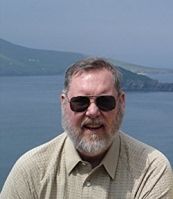
Steve Moore is an ex-scientist who has lived abroad and seen a lot of the world. His fiction reflects his interest in the human condition and how good people everywhere react and fight evil. He is now a full-time author who lives with his wife in New Jersey, but he has resided in Colombia and Massachusetts and other states in the U.S. He’s a native Californian. He loves to hear from readers and authors.
Contact Links
Purchase Links


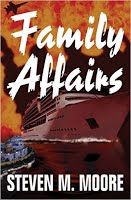
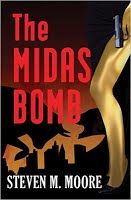

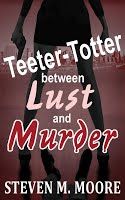

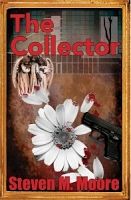

No comments :
Post a Comment